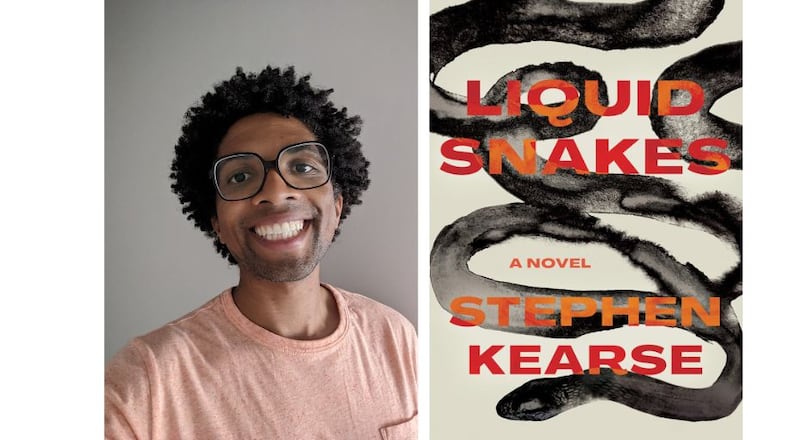With a biting sense of humor and a propulsive writing style, Atlanta native Stephen Kearse’s chilling, speculative novel “Liquid Snakes” ($27, Soft Skull Press) flays our modern life, exposing the damage wrought by racism and a dependency on chemicals and technology.
There is a lot going on in this dark, twisty whodunit set in Atlanta. Among its many threads are a plant that’s dumping dangerous chemicals in a Black neighborhood with the government’s blessing, a biochemist-turned-barista who uses an array of chemicals including snake venom to cope with grief, high school students who are killing themselves by drinking a mysterious black liquid, two CDC epidemiologists trying to figure out why, and an insidious app called EightBall. Like all good speculative fiction, “Liquid Snakes” is a social commentary on the here and now.
“Blessings do not trickle down, no matter how many prayers go up,” cautions the fine print buried in the legalese of the Terms and Conditions for the EightBall app. “Fortune, like water, gloms where it already pools, leaving the unfortunate desiccate and parched. EightBall will refresh you, but true nourishment cannot be downloaded or purchased or gifted. Paying extra for two-day delivery will not accelerate freedom’s arrival...”
“Liquid Snakes” is Kearse’s sophomore novel. Published in 2019, his literary debut, “In the Heat of the Light” (Brain Mill Press, $17.95), was also set in Atlanta. It traces the fallout after a crew of Black graffiti artists tag the Confederate memorial carving at Stone Mountain Park.
Considering the premise of his books, it comes as little surprise that social commentary is a common thread that runs through much of Kearse’s writing. A journalist and a critic who lives in Washington, D.C., he boasts a hefty portfolio of engrossing think pieces published by the likes of The Nation, The Atlantic and The New York Times, to name a few. Topics run the gamut from race and gun culture to Dave Chappelle and Wonder Woman. Much of his work is archived on his website, noreasontopretend.com, a rabbit hole of fascinating reads.
Auburn Avenue Research Library and A Cappella Books present Kearse in conversation with artist, writer and documentarian Floyd Hall at 7 p.m. Wednesday, Aug. 16, at the library. For information go to acappellabooks.com.
Credit: Forefront Books
Credit: Forefront Books
The Long View. Frederick Allen has had a long and distinguished career as a journalist in Atlanta, including stints as a reporter and political columnist at The Atlanta Constitution and an analyst and commentator at CNN. He was one of the originating panelists on the “Georgia Gang” public affairs TV show and is the author of “Secret Formula,” a history of the Coca-Cola Company, and “Atlanta Rising.”
In his new book, “Reckoning with Race” (Forefront Books, $26), Allen looks back over his career and his experience with race relations, getting to know civil rights leaders John Lewis, Hosea Williams and Andrew Young, as well as white segregationists. He explores topics that include the Confederate flag, the Atlanta child murders, Uncle Remus and the election of Maynard Jackson, Atlanta’s first Black mayor. Along the way, he owns up to not always recognizing his own white entitlement.
In a chapter on his time at the newspaper, he comments on coworker Nathan McCall, a Black reporter whom Allen barely remembered. In 1994, McCall would write the bestselling memoir “Makes Me Wanna Holler” that detailed the racism he experienced on various jobs. At the time Allen questioned the veracity of McCall’s experiences.
In retrospect, Allen observes, “my Black colleagues labored under burdens that I was not as aware of as I should have been at the time, which is to say that I should have been a better reporter and gotten the full story.”
The book’s subtitle sums up how it ends: “An Unfinished Journey.”
Credit: Public Affairs
Credit: Public Affairs
Futurama. When it comes to predicting the future, forget crystal balls and tarot cards. Amy Webb has pioneered a data-driven methodology to foresee how technology will shape our world. She shares her knowledge as a consultant with corporations and in two books: “The Big Nine” (Public Affairs, $27), about how nine global companies including Amazon, Apple and Facebook are building AI systems that are inherently flawed, and “Genesis Machine” (Public Affairs, $29), about synthetic biology.
Taking a look at what the future may hold for Georgia’s industries, Webb is the keynote speaker at A Fireside Chat presented by The Atlanta Journal-Constitution and Georgia Tech at 5:30 p.m., Wednesday, Aug. 16, at Scheller College of Business on the Tech campus. She’ll also be joined by four Tech faculty members in a conversation moderated by Rodney Gibbs, AJC senior director of strategy and innovation. Tickets are $25 and can be purchased at live.ajc.com/futureatlanta. A Cappella Books will sell books onsite.
Suzanne Van Atten is a contributing editor and book critic for The Atlanta Journal-Constitution. You can contact her at svanatten@ajc.com.
About the Author
Keep Reading
The Latest
Featured




